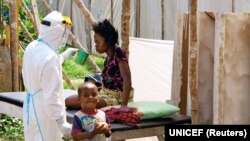As countries affected by the Ebola outbreak announce tougher measures to check the spread of the disease - including possible jail time for those accused of hiding Ebola patients - public health experts say the “get tough” approach will not work and may just alienate affected communities even more.
Senegalese social anthropologist Cheikh Ibrahima Niang said the days he spent in the village of Njala have stuck with him the most from his month of research in eastern Sierra Leone, one of the three countries most affected by the Ebola outbreak.
Njala used to be home to about 300 people, but many houses were empty. Whole families were dead, Niang said.
Struggling with outbreak
Niang said his team began interviewing residents about the Ebola outbreak and people told them it was the first time anyone had listened to them.
"They said, 'We have had 46 people die in the past month and no one has come to see us or talk to us,' " he said.
Niang said he has heard this a lot from people struggling with the outbreak: They are being left out of decisions about efforts to save them. And it's no wonder officials are meeting with resistance, he said.
Niang said, “There is this whole work of discussion and persuasion that could have been done, but instead we have authoritarian methods. And when you go that route, you will have problems.”
He said he was in the town of Kenema on July 25 when a mob tried to attack an Ebola treatment center. Police dispersed them with live bullets and tear gas.
A mentally unstable woman had declared that Ebola is a "hoax," but Niang said there was more going on.
He said these incidents "are not really about denying Ebola exists. They are an expression of the tension, the anguish people feel."
"And, above all, they are a a cry for reassurance and support," Niang said.
Measures being taken
Affected countries and their neighbors are shutting borders. Airlines are shutting down flights to and from affected countries. Sierra Leone and Liberia have security forces manning barricades and imposing quarantines.
Meanwhile, Niang said health centers and health workers in the affected countries are overwhelmed and underequipped.
Niang said the health workers he spoke to “expressed a frustration, a real anger at having been practically abandoned.”
Containing Ebola is complex.
The virus is transmitted either through eating bush meat or through contact with the bodily fluids of an infected person.
To stop an outbreak, people have to change their behaviors, their traditions.
Instead of a mother caring for, or even touching, her sick child, she is told to take the child to a hospital. Families are being told they cannot bury their dead as they always have, that people trained in burying Ebola victims must do so.
This is the domain of "the sacred," Niang said, "the absolute," the familial bonds and emotions that make us human. He said people need to be convinced that the precautions are necessary.
Get tough measures
Yet, governments are resorting to force.
Sierra Leone’s parliament voted "yes" this week to a law to jail people for as much as two years for harboring suspected Ebola patients.
Niang said those measures will not work.
He said, “This paternalistic approach has to stop. It is like we are treating people like children. Listen, take this, do that, this is good for you."
Instead, he said authorities should recognize that they are dealing with a mature population and "talk to them, adult to adult, to find solutions together.”
According to the Sierra Leone Ministry of Health, Ebola has killed 341 people in the country this year, with the total number of confirmed cases nearing 1,000.




